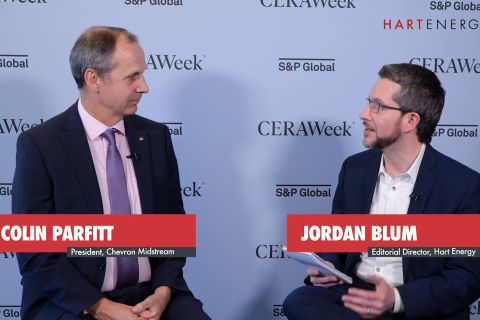
Chevron achieved the top score in Rystad’s ESG assessment of 43 public oil and gas producers in the U.S. and Canada followed by Colorado-based SM Energy Co. in the second spot. Ovintiv Inc. and ConocoPhillips Co. shared the third place. (Source: Shutterstock.com)
Even though several energy industry insiders have repeatedly said that ESG goals have taken a back seat amid increased concerns around energy security, a new study shows that more focus on ESG will drive financial benefits for U.S. shale producers in the longer term.
While operators with the lowest ESG scores outperformed the market since the recent rally, those with a higher ESG score performed better over the long term, according to the report by Rystad Energy.
The research firm evaluated the ESG performance of 43 public oil and gas producers in the U.S. and Canada, including oil majors like Exxon Mobil Corp., Chevron Corp. and BP Plc, and compared it against their stock price to understand how focusing on ESG issues impacted their share performance.
“It is clear that ESG performance impacts investor appetite, even though ESG scores have not been the lead indicator of stock growth during the latest market recovery in 2021.”—Alisa Lukash, Vice President Shale Research, Rystad Energy
Indexed to January 2021, producers with the worst ESG ratings gained almost 250 points, whereas those with the highest scores gained only around 150 points. But comparing prices on an expanded timeline, indexing to December 2016, the companies with the strongest ESG ratings gained 78 points, while the lowest performers dropped 12 points on average—clearly illustrating that ESG ratings impact long-term financial performance.
“The short-term trend is easily explained, as operators in the ESG LEAD group are mostly larger producers, with an established sustainability strategy and stronger finances,” Rystad noted in its report.
On the other hand, companies with the lowest scores included smaller, volatile producers that are still looking to build financial endurance and sustainability improvement plans. In an upcycle like the one witnessed since the start of 2021, higher leveraged and undervalued companies are the ones that recover the fastest.
“It is clear that ESG performance impacts investor appetite, even though ESG scores have not been the lead indicator of stock growth during the latest market recovery in 2021,” Alisa Lukash, Rystad Energy’s vice president of shale research, said in a statement.
“As such, ESG performance affects the ownership profile of the energy sector with sustainability-focused investors diversifying into the other sectors,” she added.
Staying ESG-focused
U.S. producers are striving to find a balance between increasing production and ensuring that the ramp-up does not result in falling behind on ESG performance. Even as Biden calls shale producers to increase output, the energy industry is under greater scrutiny to keep climate goals in check as grassroots activists and leaders press for more prompt climate action.
But major U.S. producers are not losing sight of their ESG goals, Rystad’s analysis shows.
In analyzing the ESG performance of U.S. shale operators, Rystad found that while supermajors scored the highest on the social parameter, both supermajors and diversified shale operators fared well on the environmental dimension. Additionally, diversified and Permian-focused operators scored the highest on governance.
Chevron achieved the top score in Rystad’s ESG assessment followed by Colorado-based SM Energy Co. in the second spot. Ovintiv Inc. and ConocoPhillips Co. shared the third place.
Last week, Chevron announced that the company’s participating North American upstream assets earned Project Canary’s highest ratings on operational and environmental performance. The company also reported that its onshore production methane intensity was 85% lower than the U.S. industry average in 2020.
Recommended Reading
Range Resources Plans Flat Production Target in 2024
2024-02-23 - Gas producer Range Resources is focusing on system flexibility to respond to market trends.
Permian NatGas Hits 15-month Low as Negative Prices Linger
2024-04-16 - Prices at the Waha Hub in West Texas closed at negative $2.99/MMBtu on April 15, its lowest since December 2022.
Antero Poised to Benefit from Second Wave of LNG
2024-02-20 - Despite the U.S. Department of Energy’s recent pause on LNG export permits, Antero foresees LNG market growth for the rest of the decade—and plans to deliver.
Turning Down the Volumes: EQT Latest E&P to Retreat from Painful NatGas Prices
2024-03-05 - Despite moves by EQT, Chesapeake and other gassy E&Ps, natural gas prices will likely remain in a funk for at least the next quarter, analysts said.
Exclusive: Chevron Balancing Low Carbon Intensity, Global Oil, Gas Needs
2024-03-28 - Colin Parfitt, president of midstream at Chevron, discusses how the company continues to grow its traditional oil and gas business while focusing on growing its new energies production, in this Hart Energy Exclusive interview.




